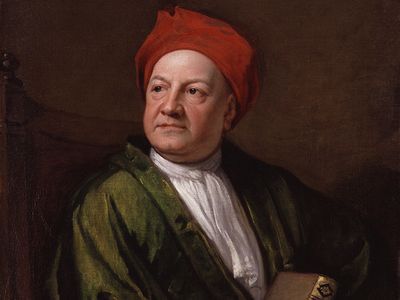The Tonsons and their poets

Photo: National Portrait Gallery, London
By MICHAEL CAINES
Publishing in the eighteenth century was meant to be a disreputable business. The standard caricature of Grub Street is of a literary alley-way infested with parasites and plagiarists. Among others lurking there you might find the bookseller Edmund Curll, who regularly ran into trouble with fellow booksellers, authors and the authorities. Curll's reputation has improved as scholars have reassessed his astutely impudent, innovative side; but there is no gainsaying such misfortunes as his hour in the stocks (a potentially fatal punishment, given how the public could treat the condemned), Alexander Pope tricking him into drinking an emetic for publishing his work without permission, and the pupils at Westminster School making him kneel and beg forgiveness, then tossing him in a blanket.
Such associates were not for every aspiring writer, especially those who fancied making their way in the world via polite society, in order to gain the ear of an affluent and free-handed patron. It was better to be seen to be above business altogether, disreputable or not, while exploiting whatever scarce possibilities for personal enrichment publication had to offer. Hence the back-handed compliment Alexander Pope could pay the great Jacob Tonson, as noted in a review by Norma Clarke in the latest TLS ��� that he was "least a bookseller". . .
I think it's fairer to say that Tonson ��� "Genial Jacob" to those of his authors who liked him, and whom he treated to feasts when contracts were signed ��� was a model of what a bookseller could be, just as Curll has been generally dismissed as his antithesis (although they did, in fact, collaborate).
Born during the Interregnum and setting up independently as a bookseller in the late 1670s, Tonson published many smart new editions of the classics, as well as the works of Dryden, Congreve and Pope. His relationship with Dryden wasn't always easy, but they formed a lucrative alliance together, and came up with an influential form of anthology (their series of "Poetic Miscellanies"). Over time, Tonson also acquired the rights to Milton's Paradise Lost, which he brought out in 1688 with authoritative emendations from Milton's manuscript, and which he continued to champion throughout his life. He could make the celebrated claim in later life that Milton was the poet who had made him the most money.
Under the care of his nephew, a second Jacob, the firm that Tonson established would go on to publish several editions of Shakespeare, boldly claiming his plays as "vernacular classics" in the process. It wasn't Shakespeare alone who benefited from such renewed enthusiasm. Stephen Bernard, the editor of The Literary Correspondences of the Tonsons (the subject of Professor Clarke's review), suggests it would be no exaggeration "to claim that the house of Tonson invented English literature as matter for repeated reading and study".
Not that this was a disinterested achievement. There was, of course, plenty of money to be made, and Tonson certainly knew how to make it; there was also a political stake in laying claim to an English literary canon. Tonson had powerful friends in political circles, and hosted the meetings of the Whig clique known as the Kit-Cat Club, which included several of his authors (such as Congreve, Addison and Steele). Suggesting a line of native literary descent was apparently in their interest. Tonson did his part by publishing not only uniform, duodecimo editions of earlier poets such as Suckling, Cowley and Milton, but also a counterpart series of contemporary authors ��� most of them Whigs, such as Addison. Pope, a Tory and a discovery by Tonson's nephew Jacob, was a notable exception.
The implication, David Foxon has observed, is that "along with Milton and Shakespeare, these were the English classics". Various scholars have written about the relationship between establishing what the classics are, taking them over in a proprietary way, as Tonson did, and then distinguishing (or condemning) modern writers accordingly; I won't go into the full argument here, but make do with these lines by Richard Blackmore, from a poem of 1708 called The Kit-Cats, to hint, in the appropriate poetic idiom of the time, at Tonson's thinking and the effects of his encouraging hospitality:
Here he assembled his Poetic Tribe,
Past Labours to Reward, and new ones to prescribe;
Hence did th'Assembly's Title first arise,
And Kit Cat Wits sprung first from Kit-Cat's Pyes . . .
The Languid Muses, now, new Life acquire,
And every Genius feels his native Fire.
The cheerful Bards their weekly Work reherse,
And noble Subjects sing in noble Verse.
Not everybody's muse received adequate remuneration, however, even after acquiring new life. Norma Clarke notes the complaint Tonson received from John Oldmixon, the dutiful Whig pamphleteer, poet and later historian, as he was banished to Bridgwater in Somerset to act as customs collector, where he was "vilifyd, insulted & having not a Minutes Ease": "Long have I been in the Service of the Muse & the Press Without any Reward & the Life I lead here is not worth living". It's somehow a relief to learn that even The Literary Correspondences of the Tonsons contains such lively signs of Grub Street at work.
In the new episode of TLS Voices, we focus on a small selection from the poetic, English side of Tonson's output: poems by Aphra Behn, the Earl of Rochester and Pope, as well as a short passage from Paradise Lost:
Peter Stothard's Blog
- Peter Stothard's profile
- 30 followers



